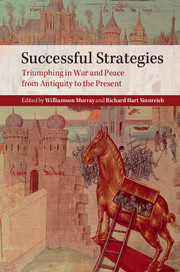Book contents
- Frontmatter
- Dedication
- Contents
- List of tables and map
- List of contributors
- Acknowledgments
- Introduction
- 1 The strategic thought of Themistocles
- 2 The grand strategy of the Roman Empire
- 3 Giraldus Cambrensis, Edward I, and the conquest of Wales
- 4 Creating the British way of war: English strategy in the War of the Spanish Succession
- 5 Failed, broken, or galvanized?
- 6 Victory by trial and error: Britain’s struggle against Napoleon
- 7 The strategy of Lincoln and Grant
- 8 Bismarckian strategic policy, 1871–1890
- 9 Dowding and the British strategy of air defense 1936–1940
- 10 US naval strategy and Japan
- 11 US grand strategy in the Second World War
- 12 American grand strategy and the unfolding of the Cold War 1945–1961
- 13 The Reagan administration’s strategy toward the Soviet Union
- Afterword
- Index
- References
5 - Failed, broken, or galvanized?
Prussia and 1806
Published online by Cambridge University Press: 05 June 2014
- Frontmatter
- Dedication
- Contents
- List of tables and map
- List of contributors
- Acknowledgments
- Introduction
- 1 The strategic thought of Themistocles
- 2 The grand strategy of the Roman Empire
- 3 Giraldus Cambrensis, Edward I, and the conquest of Wales
- 4 Creating the British way of war: English strategy in the War of the Spanish Succession
- 5 Failed, broken, or galvanized?
- 6 Victory by trial and error: Britain’s struggle against Napoleon
- 7 The strategy of Lincoln and Grant
- 8 Bismarckian strategic policy, 1871–1890
- 9 Dowding and the British strategy of air defense 1936–1940
- 10 US naval strategy and Japan
- 11 US grand strategy in the Second World War
- 12 American grand strategy and the unfolding of the Cold War 1945–1961
- 13 The Reagan administration’s strategy toward the Soviet Union
- Afterword
- Index
- References
Summary
Prussia’s experience is sui generis in the context of this project. The other contributions feature discussions of strategies with positive starting points. Prussia’s strategy of recovery involved the reconstitution of, if not a “failed state” in the contemporary sense, then arguably a broken state. A military system considered formidable even after the French Revolution’s innovations found itself overthrown in a single campaign. Its disintegration in the aftermath of the Battle of Jena-Auerstädt was comprehensive and immediate, almost literally a matter of the marching speeds of French armies. As Joachim Murat allegedly reported to Napoleon, the fighting was over because there was no enemy left.
Prussia’s collapse was humiliating. Fifty-one of the 60 infantry regiments, the army’s backbone, many with over a century of victory to their names, disappeared. Strongly garrisoned, well-provisioned fortresses surrendered at the first challenge. With no hope of relief from a broken field army, resistance appeared futile and pointless. The few last stands and hold-outs only highlighted a wasteland of senescence and incompetence. The familiar jest that Prussia was an army with its own country became grim reality as the state’s social and political fabric unraveled. The royal family fled Berlin, leaving their capital open to French occupation and looting. The Berliners for their part greeted their French conquerors with applause, while other Prussian cities greeted the French with wine and flowers. What remained of the army attached itself to a Russian ally more embarrassed than gratified by the connection. King Frederick William III focused on the surrenders when denouncing humiliations “without precedent” in his public pronouncement after the collapse. He concluded by declaring that, in the future, any soldier who distinguished himself was to be made an officer regardless of social standing.
- Type
- Chapter
- Information
- Successful StrategiesTriumphing in War and Peace from Antiquity to the Present, pp. 130 - 154Publisher: Cambridge University PressPrint publication year: 2014



